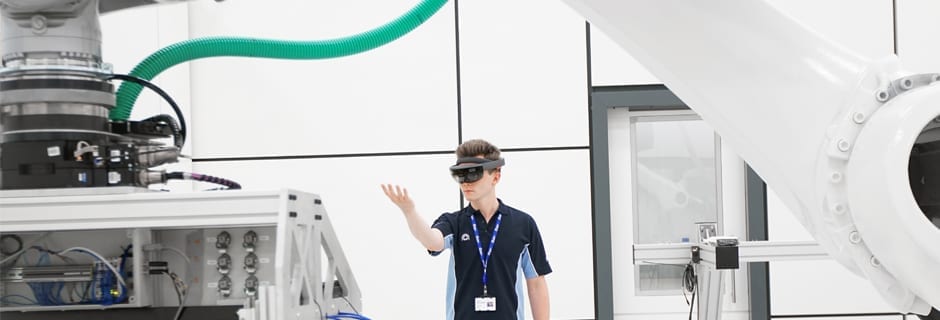The NCC has developed two specific training offerings in line with BEIS’s Developing Skills pillar; ‘building a new system of technical education to benefit the half of young people who do not go to university’.
- New courses to train more people in composite engineering and manufacturing
- Training to benefit c. 50% of young people who do not attend university, in line with Industrial Strategy
- Influenced first Trailblazer Composites Apprenticeship from September 2017. Modular training, industry group led by Rolls-Royce
- Supply chain is weak, needs building to secure more composites manufacturing in UK
- Knowledge transfer is a strong feature of the work of the NCC, including in embedding sensors in composite materials [/content_box]
[/content_boxes]
[testimonials backgroundcolor=”” textcolor=””]
[/testimonials]

Through Thickness Reinforcement Capability at the NCC
However more is required to address the increasing and predicted future composites skills shortage in the UK.
The NCC has developed two specific training offerings in line with BEIS’s Developing Skills pillar; ‘building a new system of technical education to benefit the half of young people who do not go to university’. This has been embraced by the NCC, with the Composites Sector Skills Group (SSG) to influence the first Trailblazer Composites Apprenticeship that was launched to be available from September 2017 in colleges.
The modular training, approved by UK Government, was coordinated by the NCC and was developed by a group of industry partners chaired by Rolls-Royce. This will build a cohort of technical staff to develop and manufacture the composites products of the future. The courseware currently in place is only the start. The development of knowledge capture and training offerings in composites at all levels will be a critical part of the future at the NCC. The NCC has also announced a new Composites Conversion course and enrolled its first intake of students in October 2017. The conversion course, created and delivered in partnership with the University of Bristol provides experienced but non-composites specialist engineers with an opportunity to develop composites specialisms, building their career through training at the NCC.
The course introduces composites manufacturing knowledge and principles to experienced engineers from a wealth of industry sectors.
[content_boxes layout=”icon-on-side” iconcolor=”” circlecolor=”” circlebordercolor=”” backgroundcolor=”#fffccc”]
[content_box title=”THERE’S NO SUCH THING AS DIGITAL SKILLS” icon=”” image=”” image_width=”300″ image_height=”200″ link=”” linktarget=”_self” linktext=”” animation_type=”0″ animation_direction=”down” animation_speed=”0.1″]
What we class as “digital skills” today, will be commonplace tomorrow, where digital natives (millennials, Generation Z and their offspring) will be in the majority. Digitalisation will impact jobs – high-skill jobs and low-skill jobs, yet technology has always created more jobs than it’s destroyed in the long term.
We need to get on with up/re-skilling our existing workforces and scoping our education and training to meet our needs, for example around cyber-security.
[/content_box]
[/content_boxes]
[title size=”2″]Build the composites supply chain[/title]
Furthermore, the NCC works with all scales of businesses from large OEMs through the supply chain to the mid-caps and to the micro-SME, to develop new technology solutions and deliver required skills. However for many of the emerging opportunity sectors, the supply chain is not yet complete and certainly not ready to make the switch from metal to composites on far more issues than technology and skills alone. Vertical integration of the complete composites supply chain in the UK will be encouraged and the subsequent anchoring of component manufacturing in the UK will be facilitated. This involves several issues that the NCC is currently working on to secure UK manufacturing opportunities.

Honeycomb, taken by Adrian Waine, shortlisted in the Professional category of the EEF Photography Competition 2017
Delivering affordable energy and clean growth also featured as an important pillar within BEIS and the NCC continuously promotes knowledge transfer in the use of composites materials for their lightweight, high-strength and non-corrosive qualities. In 2017, the Catapult centre has offered research and development capabilities to automotive OEMs who are using these properties to reduce the weight of vehicles to lengthen the range of use for battery-powered vehicles. NCC Member Williams Advanced Engineering worked with the centre to develop a proof of concept composites wishbone that included recycled composites material as a filler. This was used to investigate opportunities to compete with metal forgings, as well as retaining the strength and lightweight benefits and to demonstrate recyclable capabilities.
Composites materials are not new to the automotive sector but 2017 has seen increasing attention from Oil & Gas and Construction industries who have a new interest in these materials for their anti-corrosion qualities to decrease through-life maintenance costs and to reduce the industries carbon footprint through waste reduction. To help these sectors address their challenges the NCC has hosted industry focused events introducing companies to the benefits of composites materials, the NCC capability and providing an opportunity for learning across sectors to and from personnel already working with composites. A joint venture with The Oil and Gas Technology Centre saw SMEs which currently work in other sectors introduced to the emerging opportunities in that sector. A Buildoffsite event with the construction sector involved 60 delegates, many new to composites, and allowed them to discuss the opportunities and advantages of building with advanced materials, including composites.
The knowledge exchange continues when working in cross sector partnerships with other HVM Catapult Centres. CPI and the NCC have demonstrated capabilities for embedding sensors into composites materials. This merge of technologies creates an intelligent material that can measure temperature, fatigue, and stress to monitor life values of the material as an indicator of maintenance or repair. It is this capability integration across the seven centres that is critical to the success of the HVM Catapult supporting industry with the future skills required to support technology developing today. UK MR

